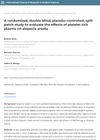 3 citations,
June 2023 in “Journal of cosmetic dermatology”
3 citations,
June 2023 in “Journal of cosmetic dermatology” A new drug, abrocitinib, helped a child with severe hair loss regrow hair.
 1 citations,
January 1996 in “The Journal of Korean Medicine Ophthalmology and Otolaryngology and Dermatology”
1 citations,
January 1996 in “The Journal of Korean Medicine Ophthalmology and Otolaryngology and Dermatology” The study found that the most common symptom of alopecia was insomnia and the most used treatment was Shineung Yangjin Dan.
69 citations,
May 2009 in “Journal of Investigative Dermatology” Stress might contribute to hair loss in alopecia areata.
24 citations,
June 2013 in “Journal of neuroendocrinology” Neuroactive steroids and the enzyme 5α-reductase might be involved in the development of Tourette's syndrome.
9 citations,
July 2021 in “Journal of Medicinal Food” Lactobacillus paracasei HY7015 helps hair grow in mice.
7 citations,
March 2022 in “Journal of the American Academy of Dermatology” Stress can trigger or worsen alopecia areata.
 November 2022 in “Skin health and disease”
November 2022 in “Skin health and disease” People with hair loss conditions often have more mental health issues like depression and anxiety compared to those without hair loss.
 July 2018 in “International Journal of Research in Medical Sciences”
July 2018 in “International Journal of Research in Medical Sciences” Platelet rich plasma was slightly more effective than no treatment for hair loss in alopecia areata patients.
January 2021 in “Przegla̧d dermatologiczny” Higher self-esteem in men with androgenic alopecia leads to less shame and more openness.
18 citations,
January 2015 in “International Journal of Trichology” Intralesional steroids are more effective for hair regrowth in alopecia areata than NBUVB, but combining them doesn't improve results.
 15 citations,
January 2020 in “Experimental Dermatology”
15 citations,
January 2020 in “Experimental Dermatology” The document concludes that understanding and treatments for alopecia areata have significantly advanced, now recognizing it as an autoimmune disorder.
 9 citations,
January 2017 in “International Journal of Trichology”
9 citations,
January 2017 in “International Journal of Trichology” The study suggests that mast cells might be involved in the hair loss condition telogen effluvium and could be a target for treatment.
 4 citations,
June 2021 in “Journal of Microbiology and Biotechnology”
4 citations,
June 2021 in “Journal of Microbiology and Biotechnology” Ginsenoside Rg4 from ginseng may help hair growth by activating certain cell signals.
3 citations,
January 2011 in “International journal of trichology” Low DHEA-S levels might be linked to alopecia areata and could be a potential treatment target.
 2 citations,
December 2023 in “JEADV. Journal of the European Academy of Dermatology and Venereology/Journal of the European Academy of Dermatology and Venereology”
2 citations,
December 2023 in “JEADV. Journal of the European Academy of Dermatology and Venereology/Journal of the European Academy of Dermatology and Venereology” The document suggests a new way to categorize skin and mind disorders into two main groups to reduce confusion.
 August 2024 in “Archives of Women s Mental Health”
August 2024 in “Archives of Women s Mental Health” Women with PCOS have more depression and stress due to high androgen levels, not obesity or insulin resistance.
 April 2022 in “International Journal of Health Sciences (IJHS)”
April 2022 in “International Journal of Health Sciences (IJHS)” A holistic treatment approach, including yoga, diet, exercise, and mindfulness, can effectively manage PCOS symptoms.
 January 2016 in “International journal of basic and clinical pharmacology”
January 2016 in “International journal of basic and clinical pharmacology” Steroid use can cause a rare eye condition called central serous retinopathy, which can lead to permanent vision damage.
 2 citations,
January 2002 in “Dermatology + psychosomatics”
2 citations,
January 2002 in “Dermatology + psychosomatics” Topiramate may cause reversible hair loss.
 1 citations,
January 2002 in “Dermatology + psychosomatics”
1 citations,
January 2002 in “Dermatology + psychosomatics” Most people worried about abnormal hair loss actually have psychological issues like depression or anxiety.
17 citations,
January 1984 in “Psychotherapy and psychosomatics” Antiandrogen treatment can reduce sexual enjoyment in women with excess male hormones, especially those in stable relationships.
 127 citations,
December 2005 in “Experimental Dermatology”
127 citations,
December 2005 in “Experimental Dermatology” Stress can stop hair growth in mice, and treatments can reverse this effect.
 137 citations,
March 2006 in “Cns Drug Reviews”
137 citations,
March 2006 in “Cns Drug Reviews” Finasteride treats enlarged prostate and hair loss, but may cause side effects in some patients.
 90 citations,
August 2002 in “European journal of endocrinology”
90 citations,
August 2002 in “European journal of endocrinology” Metformin improves hair growth and menstrual frequency in women with PCOS and hirsutism.
 83 citations,
January 2001 in “American journal of clinical dermatology”
83 citations,
January 2001 in “American journal of clinical dermatology” Clomipramine may significantly reduce hair-pulling in Trichotillomania, but more research is needed on treatments and early onset cases.
 64 citations,
February 1995 in “Journal of The American Academy of Dermatology”
64 citations,
February 1995 in “Journal of The American Academy of Dermatology” Lithium therapy may cause skin problems like hidradenitis suppurativa and other side effects, which can improve after stopping the medication.
 63 citations,
March 1995 in “International Journal of Dermatology”
63 citations,
March 1995 in “International Journal of Dermatology” Some drugs can cause hair loss, and stopping these drugs often leads to hair regrowth.
 61 citations,
September 2010 in “Genomics”
61 citations,
September 2010 in “Genomics” The study found that immune responses disrupt hair growth cycles, causing hair loss in alopecia areata.
 55 citations,
December 2006 in “Journal of The American Academy of Dermatology”
55 citations,
December 2006 in “Journal of The American Academy of Dermatology” Antidepressants called SSRIs can cause skin problems, bleeding risk, and other side effects.
 48 citations,
January 2002 in “Dermatology”
48 citations,
January 2002 in “Dermatology” Hair pain is more common in women with hair loss, but it's not linked to the cause or severity of hair loss.






















